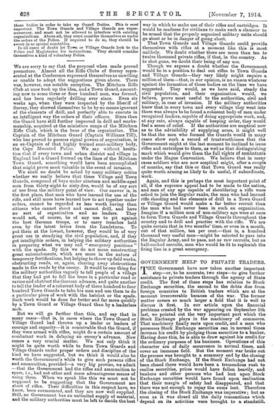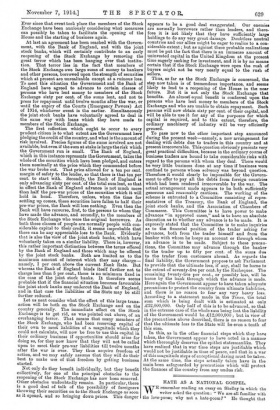GOVERNMENT HELP TO PRIVATE TRADERS. T HE Government have now taken
another important step—or, to be accurate, two steps—to give further assistance to private traders through the agency of State credit. The first of these steps has relation to Stock Exchange securities, the second to the debts due from foreign countries to British traders which are at the moment irrecoverable because of the war. The former matter covers so much larger a field that it is well to discuss it first. In our article upon the financial problems created by the war appearing on September 5th last, we pointed out the very important part which the Stock Exchange plays in the machinery of commerce. That machinery finally rests upon credit, and a man who possesses Stock Exchange securities can in normal times increase his credit by pledging those securities to a banker. Having done this, he is able to draw against his credit for the ordinary purposes of his business. Operations of this character are of daily occurrence in normal times, and cover an immense field. But the moment war broke out the process was brought to a summary end by the closing of the Stock Exchange. If the Stock Exchange had not been closed there would have been a tremendous rush to realize securities, prices would have fallen heavily, and bankers and other persons who had lent upon Stock Exchange securities would have found upon realization that their margin of safety had disappeared, and that there was not enough to repay the sums lent. Therefore the closing of the Stock Exchange was imperative ; but as soon as it was closed all the daily transactions which depend on its activities were brought to a standstill. Ever since that event took place the members of the Stock Exchange have been anxiously considering what measures can possibly be taken to facilitate the opening of the House and the starting of business again.
At last an agreement has been reached with the Govern- ment, with the Bank of England, and with the joint stock banks, which will certainly contribute to an early reopening of the Stock Exchange by removing the great terror which has been hanging over that institu- tion. That terror lies in the fact that members of the Stock Exchange owe large sums of money to bankers and other persons, borrowed upon the strength of securities which at present are unrealizable except at a ruinous loss. To meet this situation the Government and the Bank of England have agreed to advance to certain classes of persons who have lent money to members of the Stock Exchange sixty per cent. of the sums lent, and not to press for repayment until twelve months after the war, or until the expiry of the Courts (Emergency Powers) Act of 1914, whichever event is the earlier. Simultaneously the joint stock banks have voluntarily agreed to deal in the same way with loans which they have made to members of the Stock Exchange.
The first reflection which ought to occur to every prudent citizen is to what extent are the Government here pledging the credit of the country, and what is the amount of risk involved. Precise figures of the sums involved are not available, but even if the sum at stake is large the risk which the Government run is small. The Bank of England, 'which in this instance represents the Government, takes the whole of the securities which have been pledged, and enters them nominally at the price which they commanded before the war broke out. That price allowed for a ten per cent. margin of safety to the lender, so that there is that ten per cent. to start with. Secondly, the Bank of England is only advancing sixty per cent. of the total sum lent, so that in effect the Bank of England advance is not much more than half the pre-war prices of the securities which it will hold in bond. Therefore, unless, when the time for settling up comes, these securities have fallen to half their pre-war prices, the Bank will lose nothing. Even then the Bank will have recourse, first, to the persons to whom they have made the advance, and secondly, to the members of the Stock Exchange who were the original borrowers. As both these classes of people are normally people with con- siderable capital to their credit, it seems improbable that there can be any appreciable loss to the Bank. Evidently that is also the view of the joint stock banks, which have voluntarily taken on a similar liability. There is, however, this rather important distinction, between the terms offered by the Bank of England and those which may be offered by the joint stock banks. Both are limited as to the maximum amount of interest which they may charge— namely, 1 per cent, above the current Bank Rate. But whereas the Bank of England binds itself further not to charge less than 5 per cent., there is no minimum fixed in the case of the joint stock banks. It therefore seems probable that if the financial situation becomes favourable the joint stock banks may undercut the Bank of England, and in that case the liabilities of the State may be still further reduced.
Let us next consider what the effect of this large trans- action will be both on the Stock Exchange and on the country generally. The immediate effect on the Stock Exchange is to get rid, as was pointed out above, of an overhanging terror. That means that many members of the Stock Exchange, who had been reserving capital of their own to meet liabilities of a magnitude which they could not calculate, will now be free to use this capital in their ordinary business if opportunities should arise for doing so, for they now know that they will not be called upon to meet their pre-war liabilities till twelve months after the war is over. They thus acquire freedom of action, and we may safely assume that they will do their best to make use of that freedom by getting business started.
Not only do they benefit individually, but they benefit collectively, for one of the principal obstacles to the reopening of the Stock Exchange has now been removed. Other obstacles undoubtedly remain. In particular, there is a good deal of talk of the possibility of foreigners throwing their securities on to the Stock Exchange as soon as it opened, and so bringing down prices. This danger appears to be a good deal exaggerated. Our enemies are normally borrowers rather than lenders, and there- fore it is not likely that they have sufficiently large holdings to do any very great damage. Doubtless neutral countries and our allies might be eager to realize to a con- siderable extent ; but as against these probable realizations must be put the fact that there is an immense amount of uninvested capital in the United Kingdom at the present time eagerly seeking for investment, and it is by no means certain that if the Stock Exchange were open the rush of buyers might not be very nearly equal to the rush of sellers.
Thus, so far as the Stock Exchange is concerned, the step now taken is of tremendous importance, and seems likely to lead to a reopening of the House in the near future. But it is not only the Stock Exchange that benefits. An almost equal benefit is conferred upon the persons who have lent money to members of the Stock Exchange and who are unable to obtain repayment. Such persons will now obtain sixty per cent. of their capital, and will be able to use it for any of the purposes for which capital is required, and to this extent, therefore, the ordinary machinery of industry will be very efficiently greased. To pass now to the other important step announced during the present week—namely, a new arrangement for dealing with debts due to traders in this country and at present irrecoverable. This question obviously presents very great practical difficulties, because in the ordinary course of
business traders are bound to take considerable risks with regard to the persons with whom they deal. There would be very little business done at any time if business were confined to persons whose solvency was beyond question. Therefore it would clearly be impossible for the Govern- ment to offer to pay all the debts from foreign countries which had been rendered irrecoverable by the war. The actual arrangement made appears to be both sufficiently generous and reasonably cautious. The working of the scheme is entrusted to a Committee consisting of repre- sentatives of the Treasury, the Bank of England, the joint stock banks, and the Association of Chambers of Commerce. This Committee is to have power to make advances "in approved cases," and is to have an absolute discretion as to whether any advance is to be made. It is expressly stated that the Committee is to make inquiries as to the financial position of the trader asking for advances, both from the trader himself and from the banker with whom he keeps an account or through whom an advance is to be made. Subject to these precau- tions, the Committee may advance through the banker to the trader up to fifty per cent. of the sums due to the trader from customers abroad. As regards the final liability, the Government propose to ask Parliament to provide that the ultimate loss, if any, shall be borne to the extent of seventy-five per cent, by the Exchequer. The remaining twenty-five per cent., or possibly leas, will be borne by the bank through which the advance is made. Here again the Government appear to have taken adequate precautions to protect the country from ultimate liabilities, and there is no reasou to fear any very heavy loss. According to a statement made in the Times, the total sum which is being dealt with is estimated at only £32,000,000. Only half of this is to be advanced, so that in the extreme case of the whole sum being lost the liability of the Government would be £12,000,000; but in view of the precautions above described, there is no reason to fear that the ultimate loss to the State will be even a tenth of this sum.
In this, as in the other financial steps which they have taken, the Government appear to have acted in a manner which thoroughly deserves the epithet statesmanlike. They have realized that in war time steps are justifiable which would not be justifiable in time of peace, and that in a war of this magnitude steps of exceptional daring must be taken. At the same time, the steps actually taken have in the main been safeguarded by precautions which will protect the finances of the country from any undue risk.















































 Previous page
Previous page